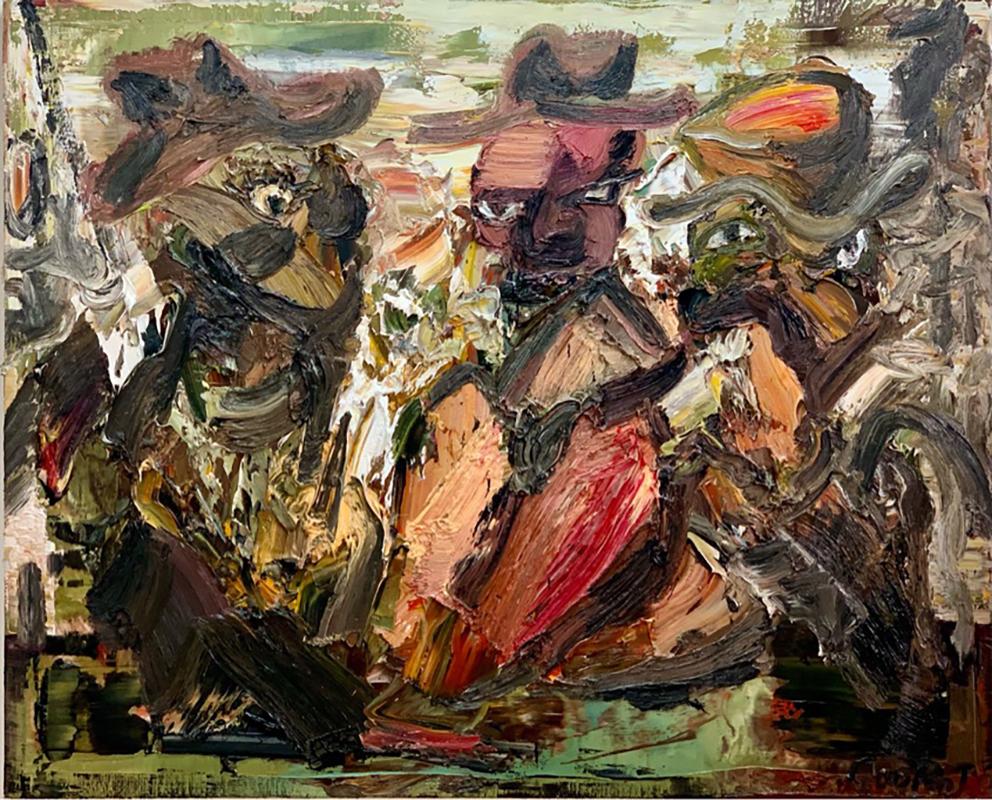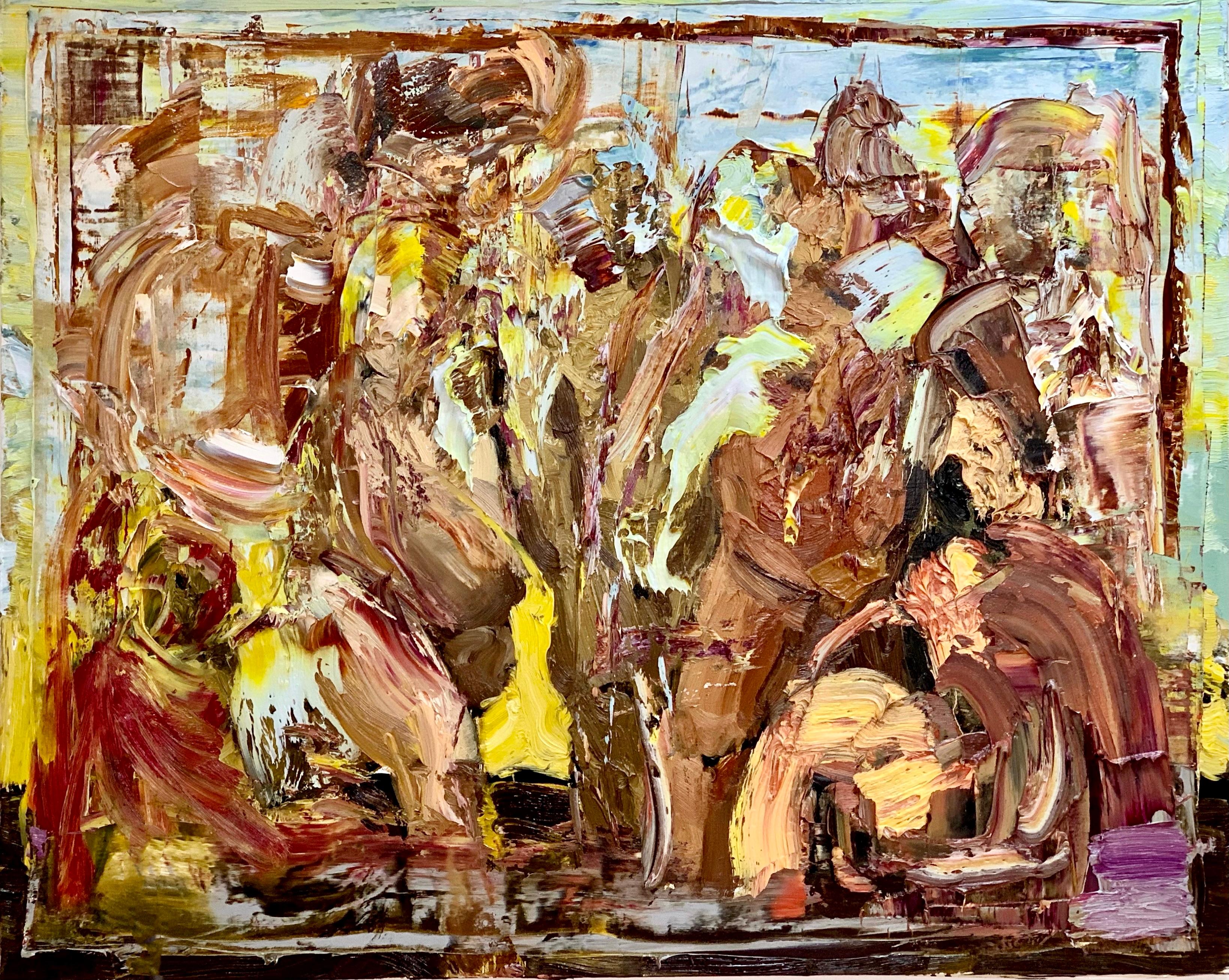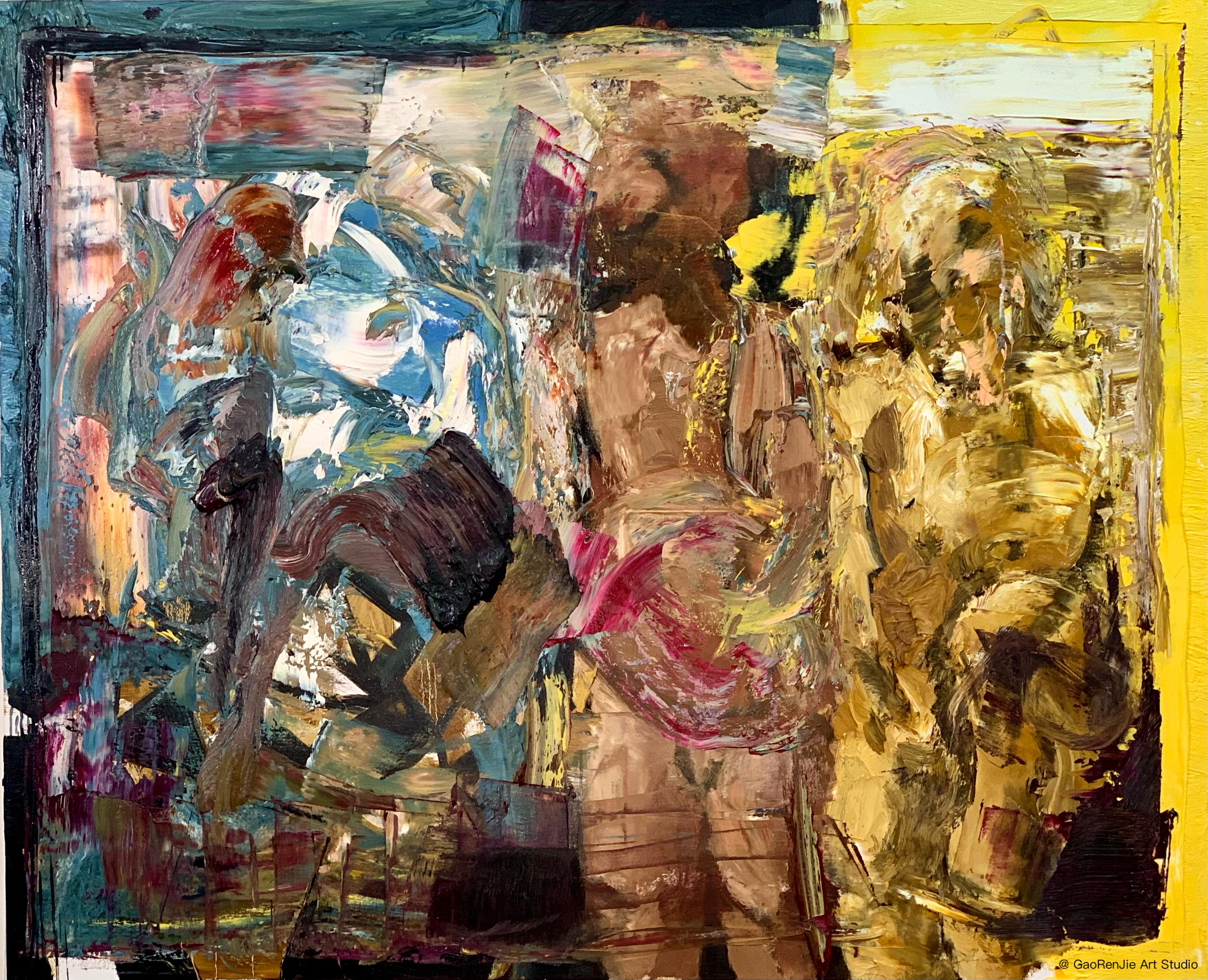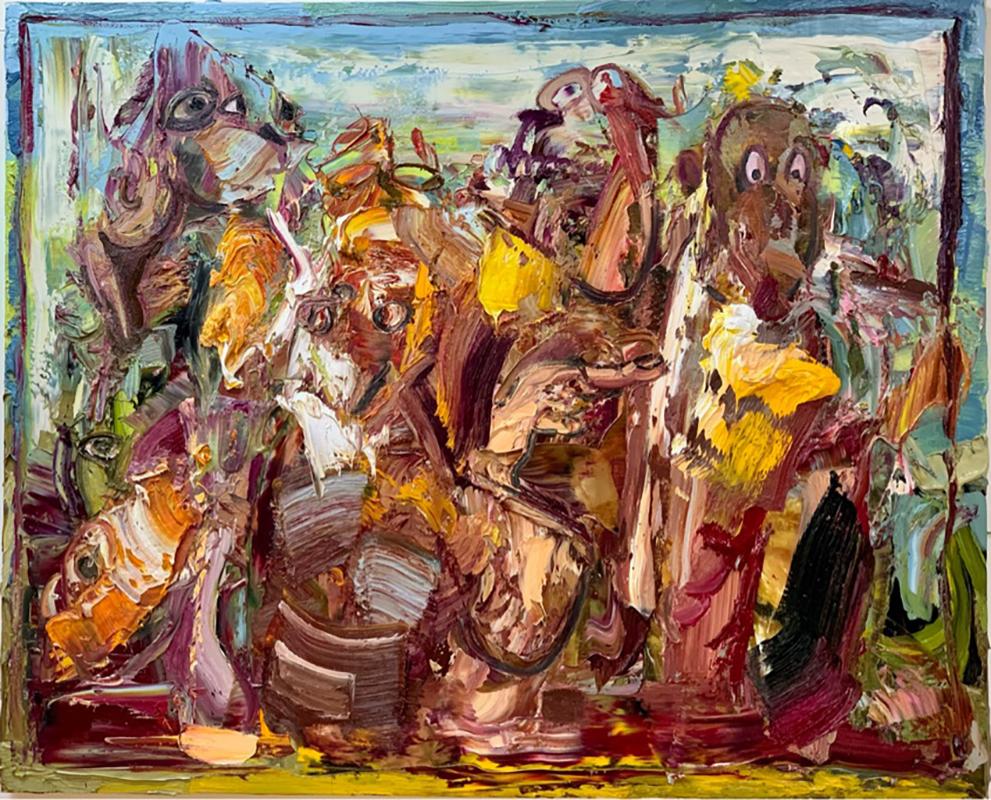Items Similar to La Contrebasse - Expressionist Musician Portrait Oil by Gen Paul
Want more images or videos?
Request additional images or videos from the seller
Gen PaulLa Contrebasse - Expressionist Musician Portrait Oil by Gen Paul1950
1950
About the Item
Signed expressionist oil on canvas portrait by French painter and engraver Gen Paul. This charming work depicts a seated musician wearing a green suit with a black bow tie playing the double bass. This beautiful example of Gen Paul's work dates to the 1950's when he painted numerous studies of musicians playing various instruments in jazz such as the saxophone, violin and the double bass. His interest in this was likely based upon his father's career as a cafe musician.
Signature:
Signed upper right
Dimensiosn:
Framed: 30"x21"
Unframed: 22"x13"
Provenance:
Private French collection
Gen-Paul was born in the Rue Lepic, at the heart of Montmartre. His mother was an embroiderer, and his father was a café musician. Gen-Paul began painting from a young age. An apprentice interior decorative artist, he looked about him in the wealthy apartments where his work took him and observed the pieces collected by art lovers, and he learned anatomy by getting to know surgeons and going with them into operating theatres. He also attended the École des Beaux-Arts. He painted on discarded cigar boxes using coloured supplements from L'Illustration as models. This was in 1913. At the outbreak of World War I he volunteered for service and was wounded; a year later a second wound led to the amputation of his right leg. Back in Paris in 1916, he began to paint. His first oil painting, the Moulin de la Galette seen from his window, dates from 1916. His early works are not easy to identify, as he painted many views of Paris to satisfy customers who wanted a painting 'in the style of so-and-so'. In 1918 he first signed a canvas Gen-Paul. In 1920 he showed work at the Salon d'Automne, remaining faithful to this institution and to the Salon des Indépendants. His first solo show took place in the Galerie Bing in 1926. He illustrated several of Céline's books, including Journey to the End of Night, Death on Tick ( Voyage au bout de la nuit, Mort à crédit) in 1942. He also produced engravings, some of which were published as a collection entitled Views of Montmartre ( Les vues de Montmartre). When World War II ended he travelled frequently to the USA and New York. In 1952 the Galerie Drouant-David in Paris put on a retrospective dedicated to him. Gen-Paul did not exhibit much, had no dealer, and travelled frequently in France and Spain. Posthumous collective exhibitions include: Galerie Roussard, Paris (1999); Marcel Aymé and the Painters ( Marcel Aymé & les peintres) exhibition, Galerie Roussard, Paris (2002).
Museum and Gallery Holdings:
Bern (Kunstmus.)
Geneva (Petit Palais)
Paris (MNAM-CCI)
- Creator:Gen Paul (1895-1975, French)
- Creation Year:1950
- Dimensions:Height: 30 in (76.2 cm)Width: 21 in (53.34 cm)
- Medium:
- Movement & Style:
- Period:
- Condition:Very good original condition.
- Gallery Location:Marlow, GB
- Reference Number:
Gen Paul
Gen Paul was born as Eugène Paul in a house in Montmartre on the Rue Lepic painted by Van Gogh, he began drawing and painting as a child. His father died when he was only 10 years old and Paul was trained to work in decorative furnishings. He served in the French army during World War I and was wounded twice, losing one of his legs.
About the Seller
5.0
Platinum Seller
These expertly vetted sellers are 1stDibs' most experienced sellers and are rated highest by our customers.
Established in 2001
1stDibs seller since 2016
672 sales on 1stDibs
Typical response time: 3 hours
- ShippingRetrieving quote...Ships From: Marlow, United Kingdom
- Return PolicyA return for this item may be initiated within 3 days of delivery.
More From This SellerView All
- Portrait de Madame Martin - Post Impressionist Divisionist Oil by Henri MartinBy Henri MartinLocated in Marlow, BuckinghamshireBeautiful signed and dated divisionist oil on canvas portrait by sought after French post impressionist painter Henri Martin. The depicts a side view the artist's wife who is wearing...Category
1890s Post-Impressionist Portrait Paintings
MaterialsCanvas, Oil
- Portrait of a Young Woman - Modernist Female Portrait Oil by Alfredo GutteroLocated in Marlow, BuckinghamshireStunning signed and dated modernist oil on canvas by Argentinian painter Alfredo Guttero. The work depicts a portrait of a young Argentinian woman. It is beautifully and the brush strokes make it almost pointillist like. This work has come from the collection of the esteemed Jewish art collector Gaston Prosper Levy and was gifted top him by the painter. Prosper Levy held one of the most important collections of modern French art - many of the works were taken by the Nazis from his home in France in 1940. This work has been assessed by the Art Loss Register and is not recorded on their database. Signature: Signed, dedicated and dated 1918 upper right Dimensions: Framed: 29"x24.5 Unframed: 26"x21.5" Provenance: Original exhibition number to frame The collection of Gaston Prosper Levy Alfredo Nicolás Guttero was born in Buenos Aires on May 26, 1882. He studies music as a child and from an early age he shows his drawing abilities. He starts a law career which he quits two years later to start painting full time. Ernesto de la Cárcova and Martín Malharro encourage him towards this change and, in 1904 he gets a scholarship to travel to France to further his work. His scholarship only lasted a year, but with his family’s help and his work related to decorative art, he manages to stay in Paris until 1917, where he studies under Maurice Denis. He moves to Spain, and towards 1917, he studies in Madrid and La Coruña. Then he moves to Segovia in 1918. In this occasion he takes parts in a collective exhibition of Argentine painters and sculptors, together with artists such as Fray Guillermo Butler and Pablo Curatella Manes, among others. After his passing through Germany, Austria and Italy, in 1925 he settles in Genova where he holds an exhibition of his entire artistic production to date. After 23 years in Europe, on September 26, 1927, Guttero arrives in Buenos Aires, and on October 20, he holds an exhibit at Asociación Amigos del Arte. That same year, the Comisión Nacional de Bellas Artes acquires for the Museo Nacional his piece: Mujeres indolentes (Indolent women). A week later he takes part in the Feria del Boliche de Arte invited by Leonardo Estarico and Atalaya. Upon his return from Genova, he continues his investigation and development of the pictorial techniques denominated by him as “cooked plaster”, a technical procedure based on a paste of plaster with pigments mixed in with glue that the artist generally applied mounted on wooden supports. As of this moment, Guttero starts in Buenos Aies an intensive array of exhibits and other activities which make a big impact on the local cultural scene, apart from continuing with his personal art production. Between 1927 and 1932, the year of his sudden death, Alfredo Guttero takes part, among other projects, in the “3ª Exposición Comunal de Artes Aplicadas e Industriales 1927- 1928”, where he is awarded the Grand Prize in the Sección Pintura Decorativa; and the “X Salón de Otoño de Rosario” (1928) where he gets the Gold Medal for the Figure category; he presents works in the exhibits organized by Ateneo Popular de la Boca (1928); “XVIII Salón Nacional“ (1929) and is awarded the Second Municipal Prize for his work Playa (Beach). In 1929, he organizes the “Nuevo Salón” in Buenos Aires, Rosario and La Plata. He presents his work at the “XIX Salón Nacional de Bellas Artes” where he gets the First Prize in painting with his work Feria (Street market); in September of that same year he inaugurates his fourth individual exhibition at Amigos del Arte and participates in the selection of paintings which will appear in post cards that this institution would print eventually. In 1930 he is named artistic advisor of the Asociación Wagneriana and director of its Plastic Arts Section. That same year he organizes the “Salón de Pintores Modernos. Primer Grupo” in Buenos Aires; exhibits at Amigos del Arte, at the “Salón de Pintores y Escultores Modernos” and at show rooms in Rosario and Santa Fe. In January, 1931 he takes part in the “First Baltimore Pan-American Exhibition of Contemporary Paintings” and is awarded the Museum of Art Award with his piece Anunciación (Announcement), which he later donates to the Museo Nacional de Bellas Artes de Buenos Aires. That same year he organizes exhibits of Miguel Carlos Victorica and Demetrio Urruchúa in Amigos del Arte and, in May, Guttero presents his work at the Salón Centenario de Montevideo, “Primer Grupo Argentino de Pintores Modernos”. In June he directs together with Falcini, courses on Plastic Art and works on stage scenery for the Colón Theater. Also in 1931, he organizes the “Salón de Pintores Modernos” in Amigos del Arte and takes part at the Salón Nacional, being awarded the Eduardo Sívori Prize. On April 15, 1932 they open together with Pedro Domínguez Neira, Raquel Forner and Alfredo Bigatti the Cursos Libres de Arte Plástico (Free plastic art courses). That same year Guttero is awarded the First Municipal Prize for his work Oda (Ode). In November, he is invited to take part in the “Salón de Arte del Cincuentenario de La Plata” and, on December 1, he dies in Buenos Aires at the age of 50. The following year, between October and November, the Dirección Nacional de Bellas Artes organizes...Category
1910s Modern Portrait Paintings
MaterialsOil, Canvas
- Poster design - Bugatti - Romantic Figurative Oil by Mariano Alonso PerezBy Mariano Alonso PérezLocated in Marlow, BuckinghamshireSigned figurative oil on canvas by Spanish romantic painter Mariano Alfonso Perez. The piece is a post design for the launch of the Bugatti Aerolithe. A woman dressed in red is sitti...Category
1930s Romantic Figurative Paintings
MaterialsCanvas, Oil
- La Toilette - Post-Impressionist Nude Oil Painting by Georges D'EspagnatBy Georges d'EspagnatLocated in Marlow, BuckinghamshireSigned oil on original canvas nude circa 1914 by French post impressionist painter Georges D'espagnat. The work depict a nude woman standing beside a wash basin in a boudoir. Signature: Signed lower right Dimensions: Framed: 45"x34" Unframed: 37"x26" Provenance: Private collection - Netherlands From the beginning of his career, it was a constant concern of Georges d'Espagnet to assert his originality. His studies at the École des Arts Décoratifs, Paris, did not last very long, for he wanted immediate independence and decided to follow courses in the private academies of Montparnasse. In about 1900, he became acquainted with Maurice Denis, Bonnard and Vuillard, and his collaboration with Denis led to a renewal of religious art in France. In 1903, d'Espagnet was one of the founders of the Salon d'Automne, and was appointed professor in charge of studios at the École des Beaux-Arts, Paris, in 1934. He illustrated a number of books: Rémy de Gourmont's Evil Prayers ( Oraisons mauvaises) (1896), The Saints of Paradise ( Les Saintes du paradis) (1898), Simone (1907), Sistine ( Sixtine) (1922); Alphonse Daudet's The Immortal ( L'Immortel) (1930); André Gide's The Pastoral Symphony ( La Symphonie pastorale); Francis Jammes' Clearings in the Sky ( Chairières dans le ciel) (1948). D'Espagnet belongs to the group of artists who made the Courrier Français so successful. The drawings of his which are published in it are strongly expressive and some bear comparison with the designs of the great Renaissance masters. He also contributed to L'Image. He often placed cheerful nudes in a landscape, reminding us that, though he moved away from the Fauves, he retained their freedom of colour and arabesque. He painted many portraits, including those of Albert André, André Barbier, Victor Boucher, Déodat de Séverac, Albert Marque, André Marty and Albert Roussel. He also painted mural decorations, including a wall for the Palais de la Découverte (1937), the ceiling of the Victor Hugo Room in the Palais du Luxembourg (1939), a decorative panel for the Palais de Justice, Toulouse (1941) and interior decorations for private houses. His landscapes are Impressionist in inspiration, and work for a certain sobriety, an intimacy, both in their composition - one, two or three sketched figures and large open spaces - and in the choice of colours and treatment with the special hazy brushstroke that marks his style. D'Espagnet took part in a number of annual Parisian exhibitions, including the Salon des Indépendants, the Salon de la Société Nationale des Beaux-Arts, the Salon d'Automne (from 1903 to 1949, except in special circumstances), the Salon de la Libre Ésthétique, Brussels (1899, 1901), the Berlin Secessionists (1940). He also exhibited at the first Salon de la Société de la Gravure sur Bois. Among other exhibitions were 1912, A Century of French Art ( Centenaire de l'art français), St Petersburg; 1916, Kunstverein, Winterthur; 1918, 1926, Galerie M. Bertheim, Paris; 1930, Contemporary French Art...Category
1910s Post-Impressionist Nude Paintings
MaterialsOil, Canvas
- Horse & Rider - Expressionist Portrait Oil Painting by Gen PaulBy Gen PaulLocated in Marlow, BuckinghamshireSigned expressionist oil on board portrait circa 1950 by French painter and engraver Gen Paul. This charming work depicts a jockey wearing red jacket and breeches seated on a white horse. This work is likely a painting of the fictional character Don Quixote from the novel by Miguel De Cervantes. Paul painted this subject on numerous occasions. Signature: Signed lower right Dimensiosn: Framed: 26.5"x21.5" Unframed: 16"x11" Provenance: Private French collection of the work of Gen Paul Gen-Paul was born in the Rue Lepic, at the heart of Montmartre. His mother was an embroiderer, and his father was a café musician. Gen-Paul began painting from a young age. An apprentice interior decorative artist, he looked about him in the wealthy apartments where his work took him and observed the pieces collected by art lovers, and he learned anatomy by getting to know surgeons and going with them into operating theatres. He also attended the École des Beaux-Arts. He painted on discarded cigar boxes using coloured supplements from L'Illustration as models. This was in 1913. At the outbreak of World War I he volunteered for service and was wounded; a year later a second wound led to the amputation of his right leg. Back in Paris in 1916, he began to paint. His first oil painting, the Moulin de la Galette seen from his window, dates from 1916. His early works are not easy to identify, as he painted many views of Paris to satisfy customers who wanted a painting 'in the style of so-and-so'. In 1918 he first signed a canvas Gen-Paul. In 1920 he showed work at the Salon d'Automne, remaining faithful to this institution and to the Salon des Indépendants. His first solo show took place in the Galerie Bing in 1926. He illustrated several of Céline's books, including Journey to the End of Night, Death on Tick ( Voyage au bout de la nuit, Mort à crédit) in 1942. He also produced engravings, some of which were published as a collection entitled Views of Montmartre ( Les vues de Montmartre). When World War II ended he travelled frequently to the USA and New York. In 1952 the Galerie Drouant-David in Paris put on a retrospective dedicated to him. Gen-Paul did not exhibit much, had no dealer, and travelled frequently in France and Spain. Posthumous collective exhibitions include: Galerie Roussard...Category
1950s Expressionist Abstract Paintings
MaterialsBoard, Oil
- La Baigneuse - Impressionist Portrait Oil Painting by Constantin TerechkovitchBy Constantin TerechkovitchLocated in Marlow, BuckinghamshireSigned impressionist figurative oil on board circa 1940 by Russian painter Constantin Terechkovitch. The piece depicts a portrait of a lady in a dress and sun hat undressing in a wooded area beside a lake. The red of the dress contrasts beautifully against the deep blue of the water. Signature: Signed lower right Dimensions: Framed: 23.5"x15.5" Unframed: 18.5"x10.5" Provenance: Private French collection - Angers Konstantin Tereshkovich went to school in Moscow, where his family had moved in 1907. In 1917 he attended classes briefly at the Moscow School of Painting, Sculpture and Architecture. In 1920, after the revolution and civil war, during which he may have served as a Red soldier, he made his way to Paris, where, since his adolescence, he had always dreamed of being a painter in the city's vibrant artistic climate. To welcome him in Paris were Larionov (this was the time of the Ballets Russes) and Soutine, who were full of the experience of living along with Chagall, Modigliani and many others in La Ruche, the famous rotunda built for the Paris Exposition and later used for artists' studios. Making a living as best he could, Tereshkovich went to draw at the Académie de la Grande-Chaumière. He joined the Montparnasse circle of Kisling, Kremen and Lanskoy and later that of Roland Oudot, Maurice Brianchon and Raymond Legueult. Later they went on to form Réalité Poétique (Poetic Reality), a spontaneous group of painters that only became formalised in 1948. Tereshkovich joined the French Foreign Legion in 1939 but was demobilised in 1940. In 1944 he fled with his family to Avallon, where he had often painted. From 1950 he lived and worked in Menton, travelling, either in search of new subject matter or for pleasure, and once every four years went to the Olympic Games, to indulge his taste for sport. When Tereshkovich arrived in Paris he was overwhelmed by it, at first letting himself simply be carried away like a tourist, by shows like the French Can-Can, whose young dancers he painted both on stage and backstage; these paintings brought him some success. In 1933, he designed sets and costumes for the Ballets Russes de Monte Carlo. That year, he also married. His wife became his favourite model, and she was joined later by their two daughters, in countless family scenes that show his evident happiness down the years. He painted a wide variety of subjects, including Portrait of Frédéric Lefèvre, L'Espagnole, La Belle Danoise, and Avallon Town Crier, all of which were typical of his style. He also painted still-lifes and landscapes, such as Church near Avallon and Landscape at Villeneuve, and many horse racing scenes (he was a great racing enthusiast). In addition, he also produced many lithographs, some of which were illustrations for works by Colette or Chekhov, as well as designs for ceramics and tapestries. In his landscapes of the outskirts of Paris and the nearby countryside he would seize on a sudden intense ray of light piercing the mists on the Seine and turn it into something quite personal. During his travels, he went in search of ever more distant landscapes, both in France and beyond. Over the years, he also painted many portraits of his painter friends and others whom he met. Some of these portraits are entirely predictable, such as that of Bonnard, for whom he had nothing but admiration, but some of his other subjects are more surprising. These include: Soutine, Bonnard, Matisse, Utrillo, Vlaminck, Dunoyer de Segonzac, Rouault, Derain, Friesz, Van Dongen and Braque. Tereshkovich exhibited in various group exhibitions, including: from 1925 at the Salon d'Automne, Paris; in 1929, in Moscow, Tretyakov Gallery, along with Chagall, Soutine, Zadkine and Puni (the exhibition of Russian artists working in France). He went on to show work in many exhibitions around the world, such as: 1951, 1st Menton Biennale, where he won the Grand Prix; 1954 to 1958, 1963, the École de Paris exhibition at the Galerie Charpentier; regularly at the Salon des Peintres Témoins de leur Temps; 1972 Galerie des Granges, Geneva, Les Maîtres de la Réalité Poétique; and 2003, Musée de Montmartre, Paris, A Russian Summer in Montmartre: St Petersburg Artists in Paris in the Early 20th Century. He also showed work in solo exhibitions: 1927 Paris, Galerie Ch. Aug. Girard; 1934 Geneva, Musée de l'Athénée; 1937 Chicago, New York; 1938 Paris, Galerie de l'Élysée; 1942 Paris, Galerie Pétridès; 1946 Paris, Galerie Dubourg; 1948, 1951 Paris, Galerie Bernier; 1953 Paris, Galerie Pétridès, and Nice, Galerie Matarasso (watercolours and lithographs); 1957 Paris...Category
Mid-20th Century Impressionist Portrait Paintings
MaterialsOil, Board
You May Also Like
- Contemporary Art, Expressionist, Portrait - The Three MusketeersLocated in Coquitlam, BCArtist: Gao, Renjie The member of the Hudson Artists Society, New York Agent of BRUNO MASSA Gallery, France Six Worldwide well-known art sales website agent KOONESS/1STDIBS/ARTPRICE/...Category
2010s Expressionist Portrait Paintings
MaterialsCanvas, Oil
- Contemporary Art, Expressionist, Portrait - WalkLocated in Coquitlam, BCArtist: Gao, Renjie The member of the Hudson Artists Society, New York Agent of BRUNO MASSA Gallery, France Six Worldwide well-known art sales website agent KOONESS/1STDIBS/ARTPRICE/...Category
2010s Expressionist Abstract Paintings
MaterialsCanvas, Oil
- Contemporary Art, Expressionist, Portrait - WE ILocated in Coquitlam, BCArtist: Gao, Renjie The member of the Hudson Artists Society, New York Agent of BRUNO MASSA Gallery, France Six Worldwide well-known art sales website agent KOONESS/1STDIBS/ARTPRICE/...Category
2010s Expressionist Portrait Paintings
MaterialsCanvas, Oil
- Contemporary Art, Expressionist, Portrait - WE IVLocated in Coquitlam, BCArtist: Gao, Renjie The member of the Hudson Artists Society, New York Agent of BRUNO MASSA Gallery, France Six Worldwide well-known art sales website agent KOONESS/1STDIBS/ARTPRICE/...Category
2010s Expressionist Portrait Paintings
MaterialsCanvas, Oil
- Contemporary Art, Expressionist, Portrait - WE IILocated in Coquitlam, BCArtist: Gao, Renjie The member of the Hudson Artists Society, New York Agent of BRUNO MASSA Gallery, France Six Worldwide well-known art sales website agent KOONESS/1STDIBS/ARTPRICE/...Category
2010s Expressionist Portrait Paintings
MaterialsCanvas, Oil
- Contemporary Art, Expressionist, Portrait - WE IIILocated in Coquitlam, BCArtist: Gao, Renjie The member of the Hudson Artists Society, New York Agent of BRUNO MASSA Gallery, France Six Worldwide well-known art sales website agent KOONESS/1STDIBS/ARTPRICE/...Category
2010s Expressionist Portrait Paintings
MaterialsCanvas, Oil






